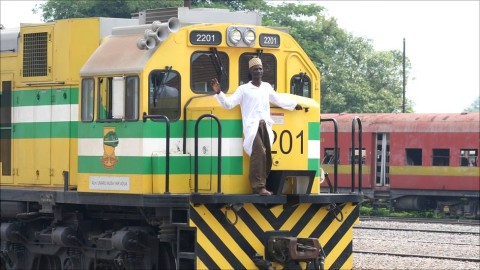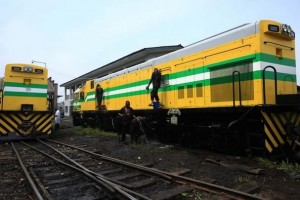When Will Our Railways Come Alive?
Articles/Opinion, Latest Headlines Saturday, June 28th, 2014
By Adewale Kupoluyi
As I was almost concluding putting this piece together, reports filtered in that a ghastly motor accident occurred on the Lagos-Ibadan Expressway, Ogun State, killing not less than six people instantly and injuring at least four others. The severe motor accident occurred around Kara Village, off OPIC Plaza, near Channels Television. Eyewitness said a tanker had broken down along the expressway road inward Ibafo without any caution sign placed before it to forewarn other motorists, adding that a driver of another truck approaching the broken down vehicle only discovered it was stationary after getting very close and in the process of trying to avert an accident, the driver of the truck was said to have swerved to the other side and rammed into another vehicle while other oncoming vehicles also rammed into others, causing a multiple accident that resulted in the death of six people instantly.
 That is the nearly daily occurrence as a result of the activities of heavy trucks plying our roads conveying goods that ordinarily should have been transported by rail. The nation’s socio-economic transformation may remain elusive if the deserved attention is not paid to the revitalization of our comatose railway system. Transportation, a major driving force of economic activities is a function of unhindered flow and movement of persons, goods and commodities. At the starting point in the manufacturing and production process, industrial inputs, this in most cases is bulky, need to be moved as raw materials to production platforms.
That is the nearly daily occurrence as a result of the activities of heavy trucks plying our roads conveying goods that ordinarily should have been transported by rail. The nation’s socio-economic transformation may remain elusive if the deserved attention is not paid to the revitalization of our comatose railway system. Transportation, a major driving force of economic activities is a function of unhindered flow and movement of persons, goods and commodities. At the starting point in the manufacturing and production process, industrial inputs, this in most cases is bulky, need to be moved as raw materials to production platforms.
Over the years, the nation had relied so much on road transportation for a number of reasons. Firstly, the few existing railway networks are restricted with limited connectivity. Going by the nature and dynamics of the goods to be moved from several parts of the country simultaneously, it becomes highly uneconomical and unattractive to business. Secondly, the Railways Act of 1955 has largely contributed to the inability of private investors and foreign entrepreneurs to inject the lifeline required for turn around. The aim of the 1955 Act is ordinarily to make the Nigerian Railway Corporation a carriage of passengers and goods in a manner that will offer full value for money, meet the cost of operation, improve market share and quality of services, ensure safety of operations and engender social responsibility in a manner that will meet the requirements of rail users. At present, our rail system is near comatose.
The dearth of infrastructural facilities could be attributed to the lack of massive capital injection that will open-up the system. There is also the age-long belief that some powerful and influential people might have deliberately turned themselves into a cartel to frustrate all efforts to make the railways work. This mafia is alleged to control road transportation business in the sense that their continued buoyancy in the railway system will spell economic doom for their investment. The absence of technical expertise is also a big issue because the nation can only boast of few indigenous personnel with the requisite experience and knowledge. Nigeria had inherited a rail network from the British Colonialists, which was designed on the north to south mode, to facilitate the flow of goods such as cotton, cocoa and groundnut from the inland to the coast, where they were eventually shipped to Britain. This railway system was made up of 3,505 route Kilometers and 4,332 track Kilometers.
The neglect of our railways has seriously deprived the country of earnings from its domestic products in addition to the underutilization of the employment generation potentials for our numerous and jobless able-bodied men and women. Presently, rail transport accounts for a tiny percentage of the GDP as road transport, freight and passenger have virtually taken over all the traffic, hitherto conveyed by rail, which is the most suitable mode of transportation for heavy traffic flows. It is worrisome that rail, which used to carry three million tonnes of freight in 1964, now carries less than 10,000 tonnes per annum! Passengers have equally declined from about 11 million in 1964, to less than one million now, putting much pressure on our roads. The heavy duty equipment that is daily being transported from one part of the country to another is largely responsible for the deplorable state of the roads. Apart from the pressure on the roads, frequent plying by truck and trailers has been largely responsible for the high incidence of road accidents involving smaller vehicles with casualties like that of Kara Village.
The strategic importance of rail transportation can never be wished away. That is why the Federal Government should take a more drastic and concerted efforts at revamping this ailing sector. In the past, piecemeal efforts were made to revive the railways. For instance in 1995, during the Sani Abacha regime, the Federal Government expended over $500m on rail contracts, awarded to the China Civil Engineering Construction Company while the Olusegun Obasanjo administration mooted the 25-year rail vision programme. The privatization of the NRC was geared to the granting of about 25-30 years of the operation regions to investors. In view of the multiplicity of these problems, the President Umaru Musa Yar’Adua/Goodluck Jonathan administration had to review the 25-year Strategic Vision Document by commencing a number of reform programmes covering systems transition, modernization and stabilization, spanning 2002 to 2027.
The Federal Ministry of Transportation is also expected to construct a speed railway with a single track line length of 1,385 km and a design speed of 120 Kilometers per hour. The contract, which represents about 13.8 per cent of China Railway Construction operating revenue, is based on Chinese accounting standards. Under the arrangement, the government is to reconstruct rail lines and provide more coaches while China intends to give support as part of its long-term partnership plan in Africa. As a way forward, the speedy passage of the Railway Bill is expected to be a major panacea that would open the railway transport sector up for an active participation of key, reputable and technically-experienced railway investors under a well-restructured Public-Private Partnership operation. This will help break the government’s monopoly which over the years has proven to be counter-productive. More importantly, there is the need to muster the political courage to deal decisively with the so-called cartel, alleged to be sabotaging genuine attempts at revamping this important sector. These mafias have also been blamed for the predicament in the power and petroleum sectors of the economy.
I am beginning to feel that fines should be introduced to discourage heavy duty vehicles from plying our roads as this will compel entrepreneurs to explore alternatives to road haulage, which the railways will definitely provide. Travelling by train, tube or metro line could be interesting. There is need for re-orientation for the populace to embrace alternative means of transport aside road and air transportation that is now becoming unreliable and horrific. Recalling the mandates of the NRC, it is expected to ensure the carriage of passengers and goods in a manner that will offer full value for money; improve the market share and quality of service amongst other modes of transportation; ensure the safety of operations and maximum efficiency; and meet the social responsibility in a manner that will meet the requirements of rail users. Genuine investors should be identified and given the necessary incentives, conducive business environment and enabling legislation to save the system from an imminent collapse. No doubt, with the genuine commitment, the railways can still work in the country provided the deadly virus called Nigerian factor and corruption that have retarded our development over the years are decisively dealt with.
Kupoluyi writes from the Federal University of Agriculture, Abeokuta, Ogun State, vide adewalekupoluyi@yahoo.co.uk
Related Posts
Short URL: https://www.africanexaminer.com/?p=13623






















